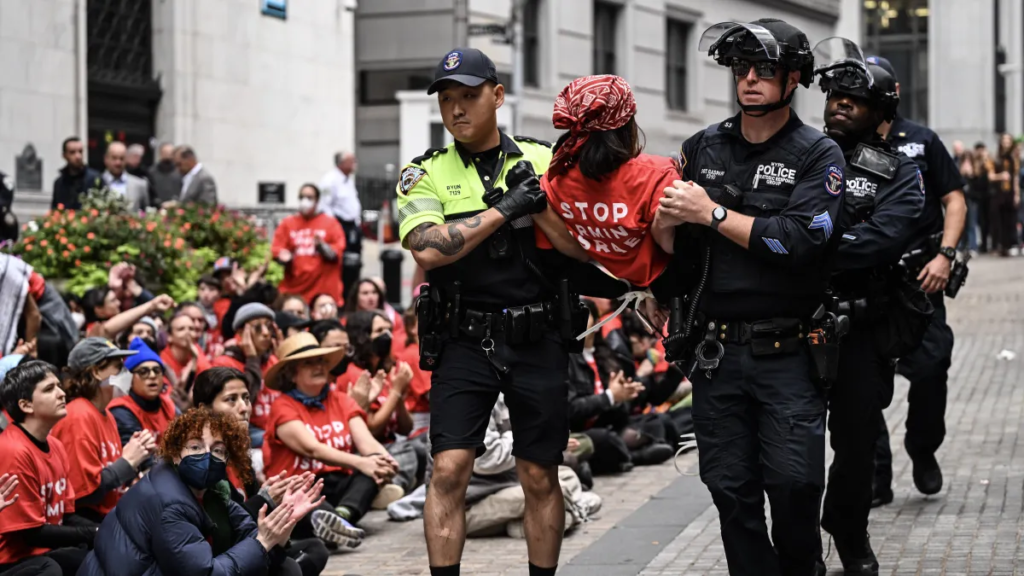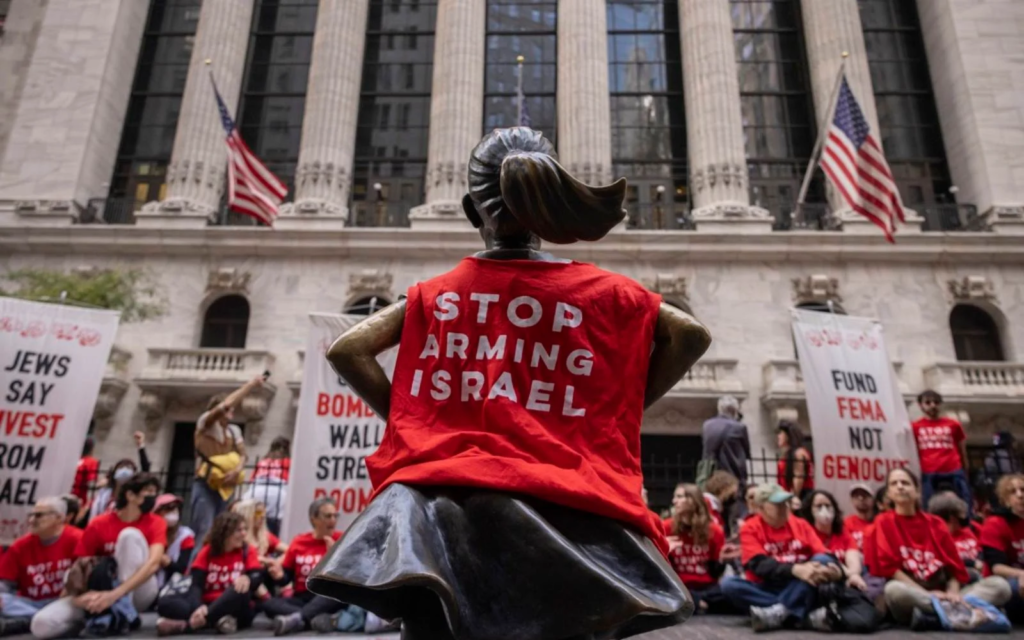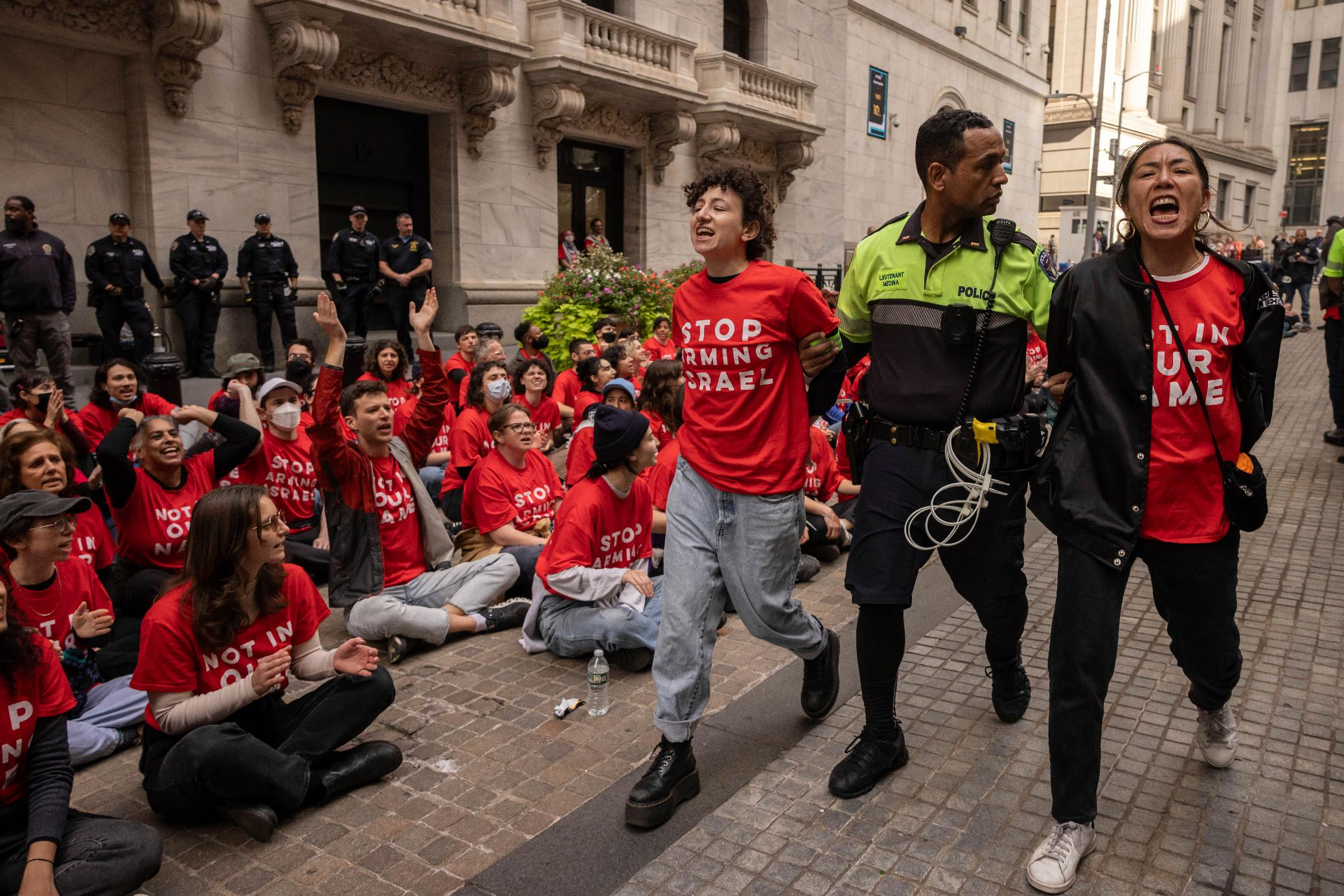Pro-Gaza Protest Held at New York Stock Exchange as ongoing conflict between Israel and Gaza continues to spark widespread demonstrations around the world, and on Monday, hundreds of pro-Palestinian protesters gathered outside the New York Stock Exchange in a significant display of opposition.
The demonstration was part of a broader call for the U.S. to halt its support for Israel in its military operations against Gaza. Tensions were high as the protesters clashed with police, leading to the arrest of more than 200 people.
The event drew attention not only for its location at one of the most iconic financial centers in the world but also for the stark division between pro-Gaza protesters and a smaller group of pro-Israel counter-protesters.
Pro-Gaza Protestors Demand an End to U.S. Support for Israel
The protesters, many of whom were affiliated with activist groups such as Jewish Voice for Peace, gathered in front of the New York Stock Exchange to send a strong message to the U.S. government.
Their demand was clear: stop supporting Israel’s military operations in Gaza. Chanting slogans like “Let Gaza live” and “Stop funding genocide,” the demonstrators voiced their outrage over what they see as the U.S. enabling Israeli actions that have resulted in massive loss of life in Gaza.
The protestors’ central message revolved around the belief that U.S. financial and military support for Israel has prolonged the suffering of the Palestinian people.

The demonstration was notable not only for the number of people involved but also for its location. The New York Stock Exchange, a symbol of American capitalism and global financial power, became a focal point for protesters who argue that U.S. defense contractors and weapons manufacturers are profiting from the ongoing war in Gaza.
These companies, they claim, supply arms to Israel, contributing to the violence in the region. Many of the protesters directed their chants at these companies, calling for an end to arms sales and military support.
Read : Third Avenue Bridge in New York Closed in All Directions Due to Overheat: Watch
None of the protesters managed to enter the stock exchange building itself, as police had set up security barricades to prevent such an incident. However, some protesters did cross the police security fence outside the main entrance, leading to a tense confrontation with law enforcement.
Despite this, the protesters remained largely nonviolent, focusing their efforts on making their voices heard rather than engaging in physical altercations with the police.
Arrests and Reactions to the Protest
The police response to the demonstration was swift. Officers arrested more than 200 protesters during the sit-in, which was staged as a form of civil disobedience. A police spokesperson confirmed that 206 arrests were made, although specific details about the charges or the treatment of the protesters were not immediately available.
The protesters, many of whom were part of Jewish activist groups like Jewish Voice for Peace, had organized the sit-in to draw attention to what they see as a moral imperative to stop the U.S. from supporting Israel’s military operations in Gaza.
The protest gained traction on social media, with Jewish Voice for Peace stating on X (formerly Twitter) that “(Hundreds) of Jews and friends are shutting down the New York Stock Exchange to demand the U.S. stop arming Israel and profiting from genocide.”
The organization has been vocal in its opposition to U.S. support for Israel and has called on the U.S. government to reconsider its policies regarding the conflict.

Despite the arrests, the protest did not result in any major violence or injuries. However, the demonstration highlighted the growing anger among pro-Palestinian activists who believe that the U.S. is complicit in the deaths of thousands of Palestinians in Gaza.
According to Gaza health officials, nearly 42,000 Palestinians have been killed since Israel launched its military response to Hamas’ October 7, 2023, attacks on Israeli civilians, which left 1,200 people dead and 250 taken hostage.
In addition to the pro-Palestinian protesters, a smaller group of pro-Israel counter-protesters also gathered near the stock exchange. Carrying Israeli flags, they attempted to push back against the narrative of the pro-Gaza demonstrators.
The counter-protesters argued that Israel’s military actions are justified as self-defense against Hamas, a group that Israel and many Western nations classify as a terrorist organization. However, the pro-Israel group was vastly outnumbered by the pro-Gaza demonstrators, and their presence did little to change the overall tone of the protest.
Broader Implications of U.S. Support for Israel in Gaza
The New York protest is just one example of the growing global movement against U.S. support for Israel’s military actions in Gaza. Demonstrations have been held in cities across the United States and around the world, as activists call for a re-evaluation of U.S. foreign policy in the region.
Critics argue that the U.S. has played a significant role in enabling Israel’s military operations by providing billions of dollars in military aid, weapons, and diplomatic backing.
Many of the protesters at the New York Stock Exchange were specifically targeting U.S. defense contractors and weapons manufacturers, accusing them of profiting from the conflict.
These companies, they argue, are supplying arms to Israel that are being used in Gaza, leading to the deaths of civilians and the destruction of homes and infrastructure. This accusation is not new, as activists have long pointed to the military-industrial complex as a driving force behind U.S. foreign policy decisions.
Israel, on the other hand, maintains that its military operations in Gaza are necessary to defend its citizens from Hamas, which launched a surprise attack on Israeli soil in early October.
Israel claims that its strikes are aimed at Hamas militants and their infrastructure, not at civilians, and has consistently denied allegations of genocide. However, the sheer scale of the destruction in Gaza, as reported by health officials and international organizations, has led to widespread condemnation of Israel’s actions, particularly as the number of civilian casualties continues to rise.
The conflict between Israel and Gaza is deeply rooted in decades of political, religious, and territorial disputes. Hamas, which controls Gaza, is committed to the destruction of Israel, while Israel seeks to eliminate Hamas as a threat to its security.
The international community, including the United Nations and many Western nations, has called for a ceasefire and a peaceful resolution to the conflict, but these calls have largely gone unheeded as the violence continues to escalate.

The U.S. has been a longstanding ally of Israel and has provided significant military and financial support to the country over the years. This relationship has come under increasing scrutiny in recent months, as the humanitarian toll in Gaza has mounted.
While the U.S. government continues to defend its support for Israel as a matter of national security and strategic interest, protests like the one at the New York Stock Exchange demonstrate that a growing number of Americans are questioning this stance.
The pro-Gaza protest at the New York Stock Exchange reflects the increasing frustration among many Americans over U.S. involvement in the Gaza conflict.
As the death toll in Gaza continues to rise and Israel presses forward with its military operations, calls for the U.S. to reconsider its support for Israel are likely to grow louder. The arrests of over 200 protesters in New York highlight the tensions surrounding this issue, both in the U.S. and abroad.
For now, the conflict in Gaza shows no signs of abating, and the international debate over U.S. foreign policy in the region is only intensifying.

